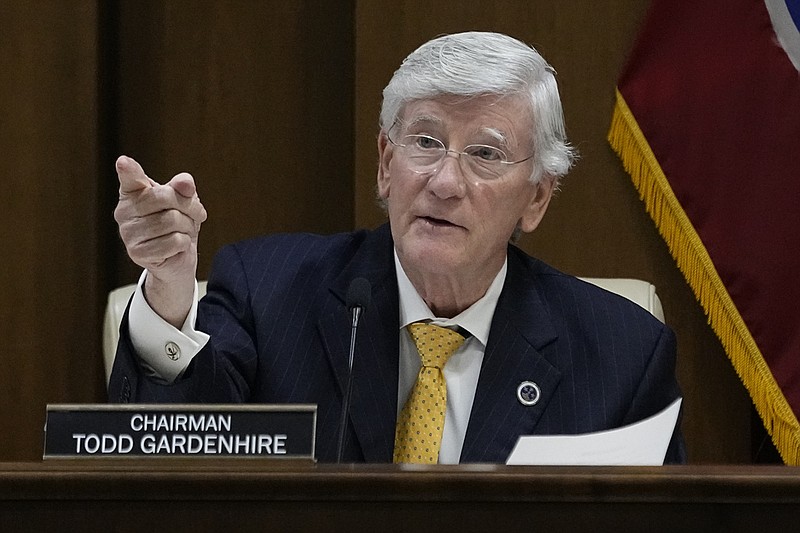NASHVILLE — Tennessee's GOP-controlled Senate advanced legislation Tuesday allowing the death penalty in child rape convictions as critics raised concerns that the U.S. Supreme Court has banned capital punishment in such cases.
Republicans approved the bill on a 24-5 vote. It must still clear the similarly conservative House chamber before it can go to Gov. Bill Lee's desk for his signature.
If enacted, the Tennessee bill would authorize the state to pursue capital punishment when an adult is convicted of aggravated rape of a child. Those convicted could be sentenced to death, imprisonment for life without possibility of parole or imprisonment for life.
Florida's Gov. Ron DeSantis enacted a similar bill nearly a year ago. Supporters in both states argue the goal is to get the currently conservative-controlled U.S. Supreme Court to reconsider a 2008 ruling that found it unconstitutional to use capital punishment in child sexual battery cases because of the Eighth Amendment protections against cruel and unusual punishments.
Chattanooga Republican Sen. Todd Gardenhire was the only Republican to vote against the bill on the Senate floor.
Gardenhire said he voted no on the bill because the sponsor couldn't answer questions about the definition of rape in simple terms. That made him nervous, he said by phone Wednesday, that there could be an opening left that would cause the law to be challenged. If the law had been written better, Gardenhire said, he would have voted yes.
"Little things like this could be a big deal in a lawsuit down the road," he said. "The law has to be crystal clear. It can't be, 'We'll figure it out later.'"
During discussion of the bill at the legislature, Gardenhire referenced a 2015 incident in which Ooltewah High School basketball players held down a teammate and penetrated him with a pool cue. Three of the players, all teenagers, were convicted of rape.
"Everybody there in that room was a child," Gardenhire said.
Gardenhire also voted against the bill when it was heard in the Senate Judiciary Committee, which he heads, in late March. Before casting his vote, he said everyone on the committee would want to see child rapists "get what's due to them."
"No matter how anybody votes on this, that is not the issue," he said. "The issue is whether or not this bill is a good bill or a bad bill."
Republican Sen. Ken Yager argued during Tuesday's debate that his bill was not unconstitutional because it only gave district attorneys the option of pursuing the death penalty for those convicted of child rape.
"We are protecting the children using a constitutional approach," Yager said. "I would not stand here and argue for this bill if I didn't believe that with my whole heart."
Yager's argument differs from the supporters inside the Tennessee legislature, where Republican House Majority Leader William Lamberth has conceded that even though Tennessee previously allowed convicted child rapists to face the death penalty, the Supreme Court ultimately nullified that law with its 2008 decision.
Other lawmakers compared their goal to the decadeslong effort that it took to overturn Roe v. Wade, the landmark 1973 case that legalized abortion nationwide but was eventually overruled in 2022.
"Maybe the atmosphere is different on the Supreme Court," said Republican Sen. Janice Bowling. "We're simply challenging a ruling."
Democrats countered the bill would instill more fear into child rape victims about whether to speak out knowing that doing so could potentially result in an execution. Others warned predators could be incentivized to kill their victims in order to avoid a harsher punishment.
Execution law in the U.S. dictates crimes must involve a victim's death or treason against the government to be eligible for the death penalty. The Supreme Court ruled nearly 40 years ago that execution is too harsh a punishment for sexual assault, and justices made a similar decision in 2008 in a case involving the rape of a child.
Currently, all executions in Tennessee are on hold as state officials review changes to its lethal injection process. Gov. Lee issued the pause after a blistering 2022 report detailed multiple flaws in how Tennessee inmates were put to death.
No timeline has been provided on when those changes will be completed. And while the state Supreme Court is free to issue death warrants for death row inmates, it has so far not done so.
Chattanooga Times Free Press staff writer Ellen Gerst contributed to this report.
